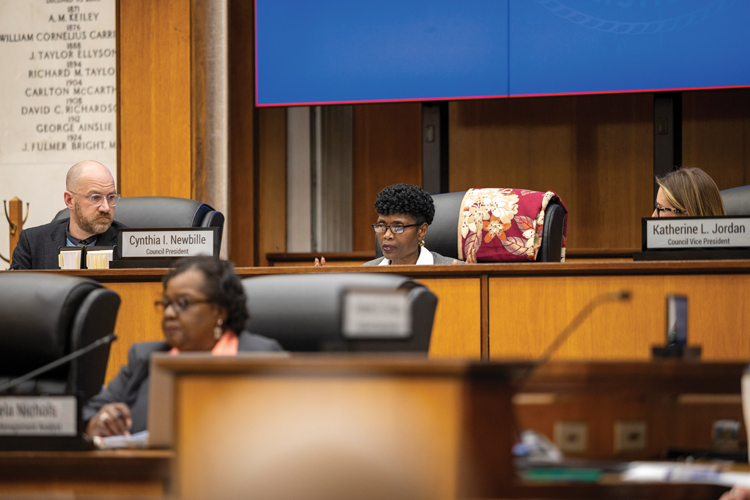Council dives into water crisis, housing
George Copeland Jr. | 1/16/2025, 6 p.m.

The long-term effects of Richmond’s recent water crisis dominated discussion at Monday evening’s Richmond City Council meeting, as city officials promised accountability and residents urged action on issues worsened due to the crisis.
The meeting began with a presentation from Mayor Danny Avula, who detailed the timeline of the weeklong water issues that concluded last Saturday and reaffirmed plans for an after-action report and an independent investigation into the outage.
Mayor Avula also announced plans to reactivate the regional emergency response fund, created during the COVID-19 pandemic, to assist those affected. He committed an initial $25,000 from the budget allocated for his canceled Inaugural Day of Service event.
The importance of collaboration between City Council and the Mayor’s Office in addressing the issues the crisis revealed or compounded was a recurring theme.
“There’s nothing like an all-out crisis in the first week of your job to just bring a team together,” Avula said. “There’s a lot of good precedent we can set together about how we’re going to serve the residents of this city.”
Other plans and proposals shared as part of a three-phase process included reassessing the city’s emergency preparedness culture, protocols and systems and establishing more water sources to help build resilience and redundancies for regional partners, reducing reliance on Richmond’s water plant.
A “water recovery week” is also in the works to encourage the public to patronize businesses affected by the outage and crisis, as well as assistance for small businesses and families through the Department of Economic Development, the Economic Development Authority and the Office of Children and Families. Avula also announced a 10-day extension to water bills and other city payments, and promised Richmonders won’t be billed for water they didn’t use.
While Avula sought to assure City Council and the public his office would comprehensively address the water crisis impact, concerns remained for officials and residents. Reva Trammell, 8th District, interjected at the end of his presentation to raise questions about the timeline for the after-action report and how long issues at the water treatment plant have been present.
 Council President Cynthia I. Newbille speaks at the City Council meeting on Jan. 13.
Council President Cynthia I. Newbille speaks at the City Council meeting on Jan. 13.Photo by Julianne Tripp Hillian/Richmond Free Press
Housing advocates and residents, meanwhile, highlighted the effects of the water crisis on evictions before and during the meeting. Dozens of residents, organizers, and others gathered in the cold evening weather for a rally outside City Hall ahead of the meeting. Many carried signs reading “Stop Evictions Now - I deserve a place to live,” while others voiced their concerns about the state of housing in the city.
During the meeting’s public comment period, New Virginia Majority member Warren Campbell, speaking on behalf of the Richmond Housing Justice Collective, urged Avula and council members to call on the General District Court to suspend evictions until at least April, and to allocate emergency funds for rental assistance.
“The eviction crisis already disproportionately impacts ... working class, minority and immigrant communities,” Campbell said. “This public health emergency is exacerbating the crisis.”
Richmond’s ongoing issues with housing insecurity and its high eviction rate have earned the city national attention in the past. Now, with new city leadership sworn into office following campaigns that included pledges to tackle this issue, advocates made clear that a swift response was needed.
“It is unrealistic to expect residents who are already experiencing historic housing insecurity to become current with their rents without assistance,” Campbell said. “It is time to take action.”
Housing and development continued to be a persistent topic throughout the meeting, as council members approved ordinances that included multiple affordable housing developments along parts of Hull Street.
City Council also approved a memorandum of understanding between the city and GRTC as part of the construction of a permanent transfer hub and mixed-use development at 500 N. 10th St., and supported the continued construction for the Diamond District redevelopment project.
The Governmental Operations Standing Committee will continue to review the impact of the water crisis and discuss potential next steps when they meet Wednesday, Jan. 22, with community discussions also in the works for the future.
Hours after the meeting adjourned, the City reported a pump failure at the water treatment plant. The issue is expected to be a focal point in upcoming discussions, including Wednesday’s Governmental Operations Standing Committee meeting and future forums on improving the plant’s infrastructure and preventing similar crises.






